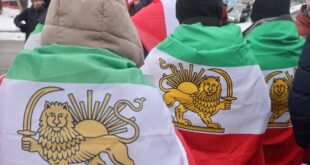 Western powers unanimously condemned communist North Korea’s announcement that it had completed an underground nuclear test. The West is in strong opposition against Iran as well, but officials stress the differences between the two countries.
Western powers unanimously condemned communist North Korea’s announcement that it had completed an underground nuclear test. The West is in strong opposition against Iran as well, but officials stress the differences between the two countries.
“Iran is a democracy. North Korea is a dictatorship led by a man who people don’t know very much about,” said a source in Whitehall, seat of Britain’s government.
Although President Bush has named both countries as part of an “axis of evil,” a US official who declined to be named said, “North Korea is a different case … I don’t expect our strategy on Iran will change. Iran certainly won’t get put on the back burner.”
EU Foreign Policy Chief Javier Solana also said as much when reporters in Brussels asked him to compare Iran and North Korea.
The United States, Germany, Britain, France, Russia and China agreed on Friday to discuss possible UN sanctions against Tehran for refusing to halt its uranium enrichment program.
Similarly, the UN Security Council is expected to meet promptly to discuss the North Korean nuclear crisis.
Hajo Funke, a professor of political science at the Free University in Berlin, said North Korea’s nuclear test would probably not make Iran’s case any different.
“Iran has already adopted an emboldened stance with the West because it is de facto backed by Russia and China and because of its resources, that is, oil,” Funke said.
The North Korean nuclear test would similarly have no impact on the EU’s plan to pursue diplomacy with Iran by pushing the UN Security Council to approve an incremental series of penalties, starting with mild political sanctions, he said.
Funke said that while North Korea may have the bomb, Iran is far from that point. Intelligence reports indicate it is years away from producing a weapon, if that is what it wants at all.
Meantime, Iranian officials showed reaction to North Korea’s nuclear test.
“Any move that endangers the world’s peace and security is unacceptable to Iran,” said a government official who asked not to be named.
However, an Iranian diplomat close to its nuclear talks with the West said North Korea’s nuclear test could push the West to think twice about its approach to the Iranian dossier.
He even appeared to issue a veiled threat that Tehran could some day follow Pyongyang’s example, saying North Korea showed “countries can adopt various methods” to reach their goals.
Iran is a signatory of the nuclear Non-Proliferation Treaty (NPT) and insists it is in full compliance with the pact. North Korea was also a signatory but withdrew in 2003 after admitting to a secret enrichment program and expelling UN inspectors.
Iran has been a host to regular IAEA inspectors and it has always shown full cooperation with the International Atomic Energy Agency. Despite intense propaganda by the US and some EU countries, the regular visits of the International Atomic Energy Agency inspectors to the Iranian nuclear sites and installations further illustrates Iran’s transparent cooperation with the IAEA.
In addition, all Iran’s nuclear activities are also supervised and recorded by the IAEA cameras installed in all Iranian nuclear sites and centers.
The last visit to Iranian nuclear sites by IAEA inspectors was paid by a two-member team whose trip to Iran took from October 1 to 5.
So far an unprecedented figure of over 2000 person/day inspections have been carried out of Iran’s nuclear facilities by the IAEA, but all inspection reports, including those presented by the IAEA Director-General Mohammad ElBaradei to the UNSC and Board of Governors, are in confirmation of Iran’s continued adherence to the IAEA and NPT rules and regulations.
A recent US Senate report alleged that Iran’s nuclear capabilities are far more advanced and beyond the information revealed to the IAEA or gained by the US intelligent agencies.
The US Senate has claimed that Iran is enriching uranium with the purity level needed for the manufacture of nuclear weapons at Natanz nuclear plant.
The report was strongly censured by the IAEA in such a way that the Agency stressed in a statement issued on September 13 that the US Senate report not only contains wrong and misleading information and data but also is unfounded.
IAEA has stressed that Iran’s nuclear activities, particularly its enrichment programs and activities, are under tight supervision of the Agency, reminding that while uranium must be enriched to a level beyond 90% of purity to be used in the manufacture of nuclear weapons, Iran has so far done the enrichment up to the purity level of only 3.5%.
 Eurasia Press & News
Eurasia Press & News



